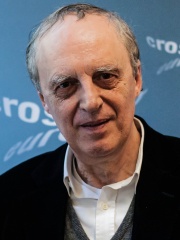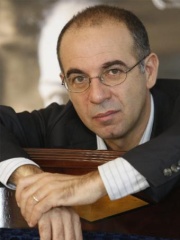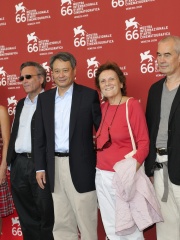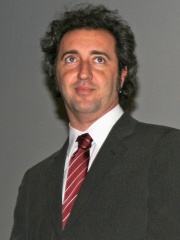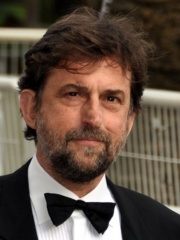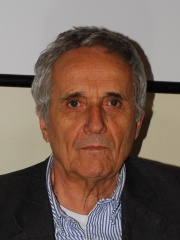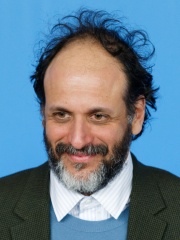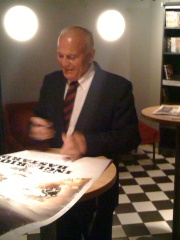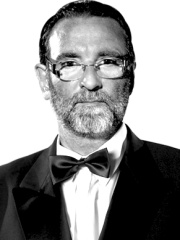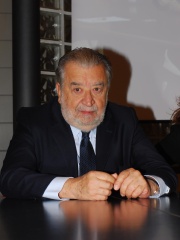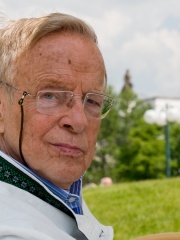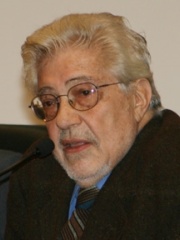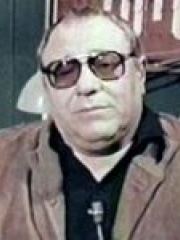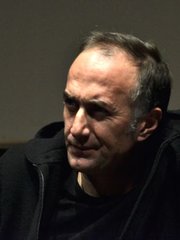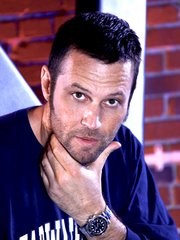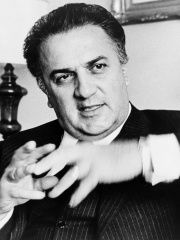
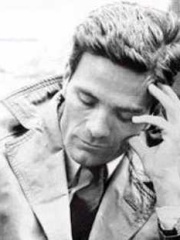
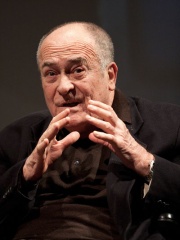
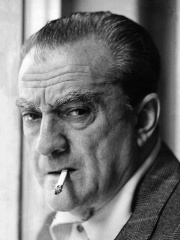
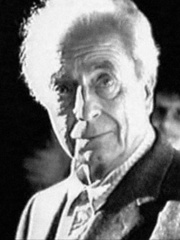
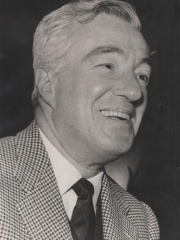
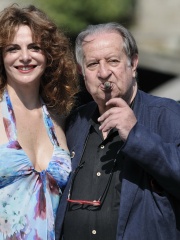

The Most Famous
FILM DIRECTORS from Italy
This page contains a list of the greatest Italian Film Directors. The pantheon dataset contains 2,041 Film Directors, 93 of which were born in Italy. This makes Italy the birth place of the 4th most number of Film Directors behind France, and United Kingdom.
Top 10
The following people are considered by Pantheon to be the top 10 most legendary Italian Film Directors of all time. This list of famous Italian Film Directors is sorted by HPI (Historical Popularity Index), a metric that aggregates information on a biography's online popularity. Visit the rankings page to view the entire list of Italian Film Directors.

1. Federico Fellini (1920 - 1993)
With an HPI of 82.49, Federico Fellini is the most famous Italian Film Director. His biography has been translated into 127 different languages on wikipedia.
Federico Fellini (Italian: [fedeˈriːko felˈliːni]; 20 January 1920 – 31 October 1993) was an Italian film director and screenwriter. He is known for his distinctive style, which blends fantasy and baroque images with earthiness. He is recognized as one of the greatest and most influential filmmakers of all time. His films have ranked highly in critical polls such as that of Cahiers du Cinéma and Sight & Sound, which lists his 1963 film 8½ as the 10th-greatest film. Fellini's best-known films include I Vitelloni (1953), La Strada (1954), Nights of Cabiria (1957), La Dolce Vita (1960), 8½ (1963), Juliet of the Spirits (1965), Fellini Satyricon (1969), Roma (1972), Amarcord (1973), and Fellini's Casanova (1976). Fellini was nominated for 17 Academy Awards over the course of his career, winning four, all in the Best Foreign Language Film category (a record). He received an honorary statuette for Lifetime Achievement at the 65th Academy Awards in Los Angeles. Fellini also won the Palme d'Or for La Dolce Vita in 1960, two times the Moscow International Film Festival in 1963 and 1987, and the Career Golden Lion at the 42nd Venice International Film Festival in 1985. In Sight & Sound's 2002 list of the greatest directors of all time, Fellini was ranked 2nd in the directors' poll and 7th in the critics' poll.

2. Pier Paolo Pasolini (1922 - 1975)
With an HPI of 79.68, Pier Paolo Pasolini is the 2nd most famous Italian Film Director. His biography has been translated into 78 different languages.
Pier Paolo Pasolini (Italian: [ˌpjɛr ˈpaːolo pazoˈliːni]; 5 March 1922 – 2 November 1975) was an Italian poet, writer, film director, actor and playwright. He is considered one of the defining public intellectuals in 20th-century Italian history, influential both as an artist and a political figure. He is known for directing The Gospel According to St. Matthew, the films from Trilogy of Life (The Decameron, The Canterbury Tales and Arabian Nights) and Salò, or the 120 Days of Sodom. A controversial personality due to his straightforward style, Pasolini's legacy remains contentious. Openly gay while also a vocal advocate for heritage language revival, cultural conservatism, and Christian values in his youth, Pasolini became an avowed Marxist shortly after the end of World War II. He began voicing extremely harsh criticism of Italian petty bourgeoisie and what he saw as the Americanization, cultural degeneration, and greed-driven consumerism taking over Italian culture. As a filmmaker, Pasolini often juxtaposed socio-political polemics with an extremely graphic and critical examination of taboo sexual matters. A prominent protagonist of the Roman intellectual scene during the post-war era, Pasolini became an established and major figure in European literature and cinema. Pasolini's unsolved and extremely brutal abduction, torture, and murder at Ostia in November 1975 prompted an outcry in Italy, where it continues to be a matter of heated debate. Recent leads by Italian cold case investigators suggest a contract killing by the Banda della Magliana, a criminal organisation with close links to far-right terrorism, as the most likely cause.

3. Bernardo Bertolucci (1941 - 2018)
With an HPI of 78.50, Bernardo Bertolucci is the 3rd most famous Italian Film Director. His biography has been translated into 80 different languages.
Bernardo Bertolucci ( BUR-tə-LOO-chee; Italian: [berˈnardo bertoˈluttʃi]; 16 March 1941 – 26 November 2018) was an Italian film director and screenwriter with a career that spanned 50 years. Considered one of the greatest directors in the history of cinema, Bertolucci's work achieved international acclaim. With The Last Emperor (1987) he became the first Italian filmmaker to win the Academy Award for Best Director, and he received many other accolades including a BAFTA Award, a César Award, two Golden Globes, a Golden Lion in 2007, and an Honorary Palme d'Or at Cannes in 2011. A protégé of Pier Paolo Pasolini, Bertolucci made his directorial debut at 22. His second film, Before the Revolution (1964), earned strong international reviews and has since gained classic status, being called a "masterpiece of Italian cinema" by Film4. His 1970 film The Conformist, an adaptation of the Alberto Moravia novel, is considered a classic of international cinema, and was nominated for an Academy Award for Best Adapted Screenplay and the prestigious Berlin Golden Bear. His 1972 erotic drama Last Tango in Paris was controversial due to its rape scene and comments made by actress Maria Schneider about her treatment on set. Bertolucci's later films such as the historical epic 1900 (1976), the family drama La Luna (1979), and the darkly comedic Tragedy of a Ridiculous Man (1981), were also controversial but acclaimed. His 1987 film The Last Emperor, a biopic of Chinese monarch Puyi, was a critical and commercial success, earning rave reviews and sweeping the 60th Academy Awards (including Best Picture and Best Director). This was the start of what has since been described as his "Oriental Trilogy", a trio of films including The Sheltering Sky, an adaptation of the novel of the same name, and Little Buddha, a Buddhist religious epic, all three of which feature scores by Ryuichi Sakamoto. His 1996 film, Stealing Beauty, brought him his second of two Palme d'Or nominations. He continued directing well into the 21st century, releasing his final film, Me and You, in 2012. Bertolucci's films often deal with themes of politics, sexuality, history, class conflict and social taboos, and his style has influenced several filmmakers. Several of his films have appeared on lists of the greatest films of all time. Critics have remarked that what makes Bertolucci different than other directors is his masterful combination of "visual richness and visual freedom".

4. Luchino Visconti (1906 - 1976)
With an HPI of 78.42, Luchino Visconti is the 4th most famous Italian Film Director. His biography has been translated into 65 different languages.
Luchino Visconti di Modrone, Count of Lonate Pozzolo (Italian: [luˈkiːno viˈskonti di moˈdroːne]; 2 November 1906 – 17 March 1976) was an Italian filmmaker, theatre and opera director, and screenwriter. He was one of the fathers of cinematic neorealism, but later moved towards luxurious, sweeping epics dealing with themes of beauty, decadence, death, and European history, especially the decay of the nobility and the bourgeoisie. Critic Jonathan Jones wrote that “no one did as much to shape Italian cinema as Luchino Visconti.” Born into a Milanese noble family with close ties to the artistic world, Visconti began his career in France as an assistant director to Jean Renoir. His 1943 directorial debut, Ossessione, was condemned by the Fascist regime for its unvarnished depictions of working-class characters, but is today renowned as a pioneering work of Italian cinema, generally regarded as the first neorealist film. During World War II, he served in the anti-fascist resistance, and afterwards was active in left-wing politics. Visconti's best-known films include Senso (1954) and The Leopard (1963), which are historical melodramas adapted from Italian literary classics, the gritty drama Rocco and His Brothers (1960), and his "German Trilogy" – The Damned (1969), Death in Venice (1971) and Ludwig (1973). He was also an accomplished director of operas and stage plays, both in Italy and abroad, and held a close association with La Scala in his hometown of Milan. Visconti received several notable accolades, including both the Palme d'Or (for The Leopard) and the Golden Lion (for 1965's Sandra), the latter out of five total nominations. He won the David di Donatello for Best Director twice and the Nastro d'Argento for Best Director four times, and was both an Oscar and BAFTA Award nominee. Six of Visconti's films are on the list of 100 Italian films to be saved. Many of his works are regarded as highly-influential to future generations of filmmakers, including Francis Ford Coppola and Martin Scorsese.
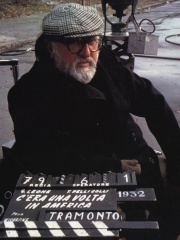
5. Sergio Leone (1929 - 1989)
With an HPI of 78.14, Sergio Leone is the 5th most famous Italian Film Director. His biography has been translated into 76 different languages.
Sergio Leone ( lee-OH-nee; Italian: [ˈsɛrdʒo leˈoːne]; 3 January 1929 – 30 April 1989) was an Italian filmmaker, credited as the pioneer of the spaghetti Western genre. He is widely regarded as one of the greatest directors in the history of cinema. Leone's film-making style includes juxtaposing extreme close-up shots with lengthy long shots. His films include the Dollars Trilogy of Westerns featuring Clint Eastwood: A Fistful of Dollars (1964), For a Few Dollars More (1965), and The Good, the Bad and the Ugly (1966); and the Once Upon a Time films: Once Upon a Time in the West (1968), Duck, You Sucker! (1971), and Once Upon a Time in America (1984).

6. Michelangelo Antonioni (1912 - 2007)
With an HPI of 76.78, Michelangelo Antonioni is the 6th most famous Italian Film Director. His biography has been translated into 70 different languages.
Michelangelo Antonioni ( AN-toh-nee-OH-nee or an-TOH-; Italian: [mikeˈlandʒelo antoˈnjoːni]; 29 September 1912 – 30 July 2007) was an Italian film director, screenwriter, and editor. He is best known for his "trilogy on modernity and its discontents", L'Avventura (1960), La Notte (1961), and L'Eclisse (1962); the English-language film Blowup (1966); and the multilingual The Passenger (1975). His films have been described as "enigmatic and intricate mood pieces" that feature elusive plots, striking visual composition, and a preoccupation with modern landscapes. His work substantially influenced subsequent world art cinema. Antonioni received numerous awards and nominations throughout his career, being the first and one of two directors, the other being Jafar Panahi, to have won the Palme d'Or, the Golden Lion, the Golden Bear and the Golden Leopard. Three of his films are on the list of hundred Italian films to be saved. He received Academy Award nominations for Best Director and Best Original Screenplay for Blowup. In 1995, he received an Honorary Oscar "in recognition of his place as one of cinema's master visual stylists".

7. Vittorio De Sica (1901 - 1974)
With an HPI of 75.36, Vittorio De Sica is the 7th most famous Italian Film Director. His biography has been translated into 76 different languages.
Vittorio De Sica ( də SEE-kə, Italian: [vitˈtɔːrjo de ˈsiːka]; 7 July 1901 – 13 November 1974) was an Italian film director and actor, a leading figure in the neorealist movement. Widely considered one of the most influential filmmakers in the history of cinema, four of the films he directed won Academy Awards: Sciuscià and Bicycle Thieves (honorary), while Yesterday, Today and Tomorrow, and Il giardino dei Finzi Contini won the Academy Award for Best Foreign Language Film. Indeed, the great critical success of Sciuscià (the first foreign film to be so recognized by the Academy of Motion Picture Arts and Sciences) and Bicycle Thieves helped establish the permanent Best Foreign Film Award. These two films are considered part of the canon of classic cinema. Bicycle Thieves was deemed the greatest film of all time by Sight & Sound magazine's poll of filmmakers and critics in 1952, and was cited by Turner Classic Movies as one of the 15 most influential films in cinema history. De Sica was also nominated for the Academy Award for Best Supporting Actor for playing Major Rinaldi in American director Charles Vidor's 1957 adaptation of Ernest Hemingway's A Farewell to Arms, a movie that was panned by critics and proved a box office flop. De Sica's acting was considered the highlight of the film.

8. Tinto Brass (b. 1933)
With an HPI of 74.81, Tinto Brass is the 8th most famous Italian Film Director. His biography has been translated into 42 different languages.
Giovanni "Tinto" Brass (born 26 March 1933) is an Italian film director and screenwriter. In the 1960s and 1970s, he directed many critically acclaimed avant-garde films of various genres. Today, he is mainly known for his later work in the erotic genre, with films such as Caligula, Così fan tutte (released under the English title All Ladies Do It), Paprika, Monella (Frivolous Lola) and Trasgredire.

9. Roberto Rossellini (1906 - 1977)
With an HPI of 74.58, Roberto Rossellini is the 9th most famous Italian Film Director. His biography has been translated into 63 different languages.
Roberto Gastone Zeffiro Rossellini (8 May 1906 – 3 June 1977) was an Italian film director, screenwriter and producer. He was one of the most prominent directors of the Italian neorealist cinema, contributing to the movement with films such as Rome, Open City (1945), Paisan (1946), and Germany, Year Zero (1948). He is also known for his films starring his then wife Ingrid Bergman, Stromboli (1950), Europe '51 (1952), Journey to Italy (1954), Fear (1954) and Joan of Arc at the Stake (1954).
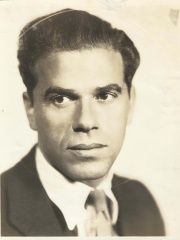
10. Frank Capra (1897 - 1991)
With an HPI of 72.77, Frank Capra is the 10th most famous Italian Film Director. His biography has been translated into 72 different languages.
Frank Russell Capra (born Francesco Rosario Capra; May 18, 1897 – September 3, 1991) was an Italian-American film director, producer, and screenwriter who was the creative force behind several major award-winning films of the 1930s and 1940s. Born in Italy and raised in Los Angeles from the age of five, his rags-to-riches story has led film historians such as Ian Freer to consider him the "American Dream personified". Capra became one of America's most influential directors during the 1930s, winning three Academy Awards for Best Director from six nominations. Among his leading films were It Happened One Night (1934), Mr. Deeds Goes to Town (1936), You Can't Take It with You (1938), and Mr. Smith Goes to Washington (1939). During World War II, Capra served in the U.S. Army Signal Corps and produced propaganda films, such as the Why We Fight series. After World War II, Capra's career declined as his later films, such as It's a Wonderful Life (1946), performed poorly when they were first released. Beginning in 1950, his cinematic output slowed, and he retired from filmmaking in the mid-1960s. In the ensuing decades, however, It's a Wonderful Life and other Capra films were reevaluated favorably by critics. Outside of directing, Capra was active in the film industry, engaging in various political and social activities. He served as President of the Academy of Motion Picture Arts and Sciences, worked alongside the Writers Guild of America, and was head of the Directors Guild of America.
People
Pantheon has 93 people classified as Italian film directors born between 1875 and 1981. Of these 93, 30 (32.26%) of them are still alive today. The most famous living Italian film directors include Tinto Brass, Dario Argento, and Giuseppe Tornatore. The most famous deceased Italian film directors include Federico Fellini, Pier Paolo Pasolini, and Bernardo Bertolucci. As of April 2024, 3 new Italian film directors have been added to Pantheon including Stefano Sollima, Axel Braun, and Emanuele Crialese.
Living Italian Film Directors
Go to all RankingsTinto Brass
1933 - Present
HPI: 74.81
Dario Argento
1940 - Present
HPI: 71.13
Giuseppe Tornatore
1956 - Present
HPI: 69.56
Liliana Cavani
1933 - Present
HPI: 66.71
Paolo Sorrentino
1970 - Present
HPI: 65.94
Nanni Moretti
1953 - Present
HPI: 65.43
Marco Bellocchio
1939 - Present
HPI: 64.87
Luca Guadagnino
1971 - Present
HPI: 59.99
Enzo G. Castellari
1938 - Present
HPI: 59.09
Mario Salieri
1957 - Present
HPI: 58.63
Sergio Martino
1938 - Present
HPI: 58.48
Pupi Avati
1938 - Present
HPI: 58.46
Deceased Italian Film Directors
Go to all RankingsFederico Fellini
1920 - 1993
HPI: 82.49
Pier Paolo Pasolini
1922 - 1975
HPI: 79.68
Bernardo Bertolucci
1941 - 2018
HPI: 78.50
Luchino Visconti
1906 - 1976
HPI: 78.42
Sergio Leone
1929 - 1989
HPI: 78.14
Michelangelo Antonioni
1912 - 2007
HPI: 76.78
Vittorio De Sica
1901 - 1974
HPI: 75.36
Roberto Rossellini
1906 - 1977
HPI: 74.58
Frank Capra
1897 - 1991
HPI: 72.77
Franco Zeffirelli
1923 - 2019
HPI: 72.02
Ettore Scola
1931 - 2016
HPI: 68.21
Sergio Corbucci
1926 - 1990
HPI: 68.07
Newly Added Italian Film Directors (2025)
Go to all RankingsStefano Sollima
1966 - Present
HPI: 52.16
Axel Braun
1966 - Present
HPI: 49.33
Emanuele Crialese
1965 - Present
HPI: 46.31
Overlapping Lives
Which Film Directors were alive at the same time? This visualization shows the lifespans of the 25 most globally memorable Film Directors since 1700.

